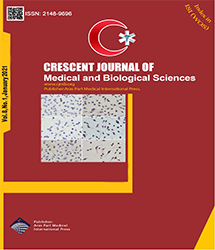
| Review | |
| New Therapies for Melanoma Cancer Strategies | |
| Dawood Agamohammadi1, Morteza Delkhosh Reihan2, Farhad Mirzaei3, Zahra Payandeh4, Haleh Farzin1, Marzieh Marahem5 | |
| 1Department of Anesthesiology, Tabriz University of Medical Sciences, Tabriz, Iran 2Fellowship of Palliative Medicine, Tabriz University of Medical Sciences, Tabriz, Iran 3Department of Neurosurgery, Faculty of Medicine, Tabriz University of Medical Sciences, Tabriz Iran 4Department of Medical Biotechnology and Nanotechnology, Faculty of Medicine, Zanjan University of Medical Sciences, Zanjan, Iran 5Department Medicine Physiology, Tabriz University of Medical Sciences, Tabriz, Iran |
|
|
CJMB 2021; 8: 003-009 Viewed : 3203 times Downloaded : 3087 times. Keywords : Monoclonal antibody, Melanoma cancer, mRNA vaccines, Palliative care |
|
| Full Text(PDF) | Related Articles | |
| Abstract | |
Objectives: Melanoma is the most common and severe type of skin cancer. Patients with melanoma may undergo surgery, chemotherapy, biological therapy (immunotherapy and cancer vaccine designation), radiation therapy, or a combination of these regimens. In addition, at any stage, they may attempt to relieve and control pain and other symptoms of malignancy, along with reducing the side effects of treatment approaches and emotional and practical problems that are treated by managing the symptoms of illness, supportive care, or so-called palliative care. Some therapeutic strategies are the application of immunotherapy and the design of a cancer vaccine which can activate active immune response by stimulating T-cells and reducing the tumor volume and size. Consequently, it creates the memory of immunity. One of the main causes of cancer immunotherapy is T lymphocyte cytotoxicity in cancer. The next strategy is to use immunotherapies (monoclonal antibodies), including antibodies against CD20, CD40, CTLA-4, and PD-1 antigens. Methods: This study was reviewed by using a search of keywords including "mRNA vaccination", "monoclonal antibody", "melanoma", and "CD20 antigen" in Google Scholar, PubMed, and Elsevier databases. Approximately 60 articles were selected that were examined thoroughly. Results: The results of our study revealed that vaccine cluster of differentiation, monoclonal antibodies are considered as treatments for melanoma cancer. Conclusions: mRNA plays a key role as the biological treatment of melanoma. More precisely, it is a vector for tumor antigens and a stimulator for inducing antitumor immune responses. In this regard, the study groups use strategies based on the mRNA encoding of the entire mRNA tumor in both in vivo and in vitro environments. Finally, the use of anti-CD20 antibodies with the activator and the inhibitors of immunosuppressive agents have been successful, and surveys in this area have focused on this issue. |
Cite By, Google Scholar
Google Scholar
PubMed
Online Submission System
 CJMB ENDNOTE ® Style
CJMB ENDNOTE ® Style
 Tutorials
Tutorials
 Publication Charge
Medical and Biological Research Center
About Journal
Publication Charge
Medical and Biological Research Center
About Journal
Aras Part Medical International Press Editor-in-Chief
Arash Khaki
Deputy Editor
Zafer Akan


















